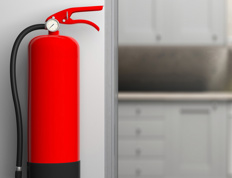Damage resulting from earthquakes is never covered under home insurance policies. If required, ask your insurance representative to add an endorsement or additional coverage against this type of damage. Also, prepare a detailed inventory of your property to make filing a claim easier.
Earthquakes: do you know what to do?


An earthquake doesn’t have to be on a Hollywood-movie scale to cause damage. It takes only a few seconds for an earthquake to knock objects over, while a more intense event can weaken buildings and disrupt utilities like electricity and natural gas. Here’s how to protect yourself and what to do during an earthquake.
Earthquakes in Canada?
According to Earthquakes Canada, some areas of the country are at a higher risk of earthquake-related damage. That’s the case for British Columbia and the Yukon, but also for several regions of Quebec, including Greater Montreal, the Ottawa Valley, Bas-Saint-Laurent, Côte-Nord and the Charlevoix-Kamouraska area.
Preparing for an earthquake
Basic natural disaster precautions apply when an earthquake strikes. Have an emergency kit with flashlights, a battery-operated radio, a first aid kit, non-perishable food and 6 l of drinking water per person on hand. Make a family emergency plan, including an assembly point if you become separated.
Secure furniture, shelves, mirrors, large electronic devices such as televisions and tools that can cause injury to prevent them from being knocked over or thrown. Store heavy items on the bottom of shelves for stability, and make sure hazardous materials are safely stored.
Does your home insurance cover earthquakes?
What to do during an earthquake
If you’re inside, stay there. Your first reaction should be to drop, cover and hold on to something as quickly as possible.
- Drop down to ground level to avoid losing balance.
- Cover under a sturdy piece of furniture, like a table. If no cover is available, stay away from windows and unstable objects and stay on the ground, protecting your head and neck with your arms.
- Hold on tightly to the furniture until the shaking stops.
Contrary to popular belief, sheltering under doorways is not safe.
If you’re outdoors, stay away from buildings, power lines and any structure that could collapse, like a commercial sign or billboard.
What to do after an earthquake
Once the shaking stops, check if anyone near you is injured. Call emergency services and, if you are able, administer first aid.
Next, check the condition of your home. Evacuate the premises if the damage appears serious, if a fire is starting or there’s a gas leak. If there is a gas leak, turn the gas off and open the windows before leaving, if possible.
If you need to leave your home, take your emergency kit with you and let your loved ones and your town know where you’ll be taking shelter. Follow the safety instructions and wait until you’re told that it’s safe to return home.
home insurance
damages
earthquake
advice



















